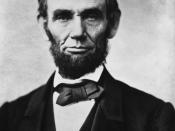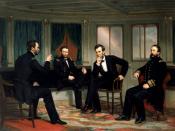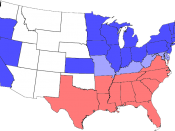American churches during the nineteenth century began to replace certain established doctrines of religious piety with the tenet of moralism.l Denominations throughout the nation experienced dynamic, internal social changes as ministers began to preach with less vigor in reverence to God and devotion to religion, and became more inclined to sermonize on virtuous conduct according to society's established mores. The decades between 1850 and 1870, encompassing the American Civil War and several catastrophic denominational schisms, are particularly indicative of this change from piety to moralism, and the events of these years created the catalytic atmosphere culminating in the era of church institutionalization in America.
In large measure the Civil War accelerated the process of church institutionalization and laid the groundwork for the development of a late nineteenth-century Social Gospel. Without a doubt, the War forced religious groups to temporarily displace spirituality's priority with a deep concern for social and political activities.
Indeed, throughout the conflict, one of the most pressing questions before the churches was the moral query regarding the sinfulness of the rebellion. Was the rebellion also a sin against God? And was it the duty of the churches to support the Union? A minister's answer to these questions obviously varied in relation to his geographic location and political outlook. Most Northern church leaders categorized the rebellion as a sin, and more often than not as a most damnable transgression, as did the Rev. Robert J. Breckenridge when he vehemently harangued the Southern Presbyterians at the 1862 National Presbyterian Assembly, alleging them guilty of everything from "treason" to "blasphemy," ad nauseam.2 Southern ministers, on the other hand, were able to justify the rebellion and retain essentially the same religious principles as their brothers in faith to the north; but in the same breath, Southern ecclesiastics brought down the Almighty's...


